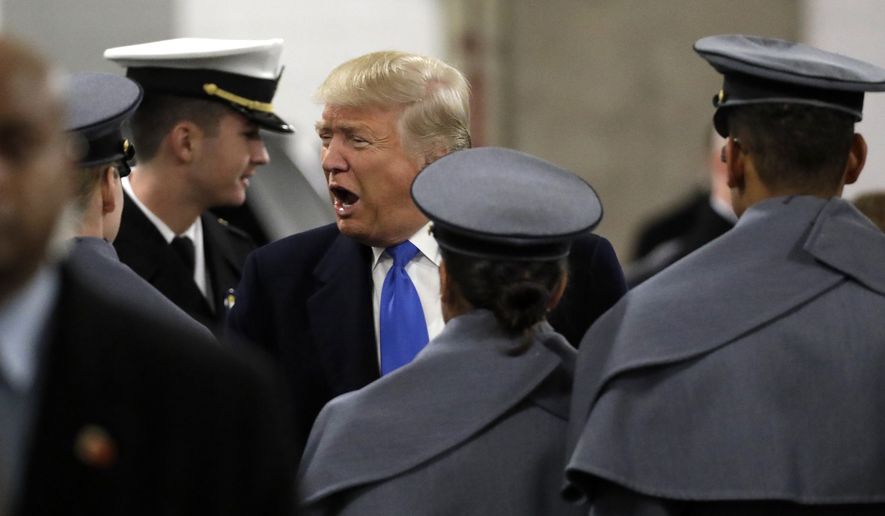President-elect Donald Trump called for the U.S. to expand its nuclear capabilities, in a surprising Twitter post Thursday that raised questions about what he intends to do.
“The United States must greatly strengthen and expand its nuclear capability until such time as the world comes to its senses regarding nukes,” he said.
It was not clear what prompted the message, though the statement came soon after Russian President Vladimir Putin said his own nuclear forces needed to be strengthened.
It’s not clear exactly what capabilities either man had in mind.
But together, they appear to be heading for a major reversal of bilateral policy which for decades has seen both countries trim their nuclear arsenals — even as they underwent some efforts at modernization.
During the presidential campaign Mr. Trump seemed to suggest he saw a world where more nuclear weapons could aid, not undermine, stability.
“Wouldn’t you rather in a certain sense have Japan have nuclear weapons when North Korea has nuclear weapons,” he said at a CNN town hall, touching on a longstanding debate about mutual proliferation and its effects.
Mr. Trump went on to say that he doesn’t want to see more proliferation, and in an interview with the New York Times called it the world’s “biggest problem” — but also said it’s difficult to prevent.
He also said the U.S. arsenal was in “terrible shape” and needed to be updated, but said it was “highly unlikely” he would ever see a need to use nuclear weapons.
Michaela Dodge, a defense policy analyst at the Heritage Foundation, said she isn’t sure what Mr. Trump had in mind with his call for expanded capabilities, but she said if he’s looking to reverse the course under President Obama it would be welcome.
In particular, she said, the nuclear doctrine laid out in a 2010 policy review got many of the assumptions about the nuclear world wrong.
“For example, we don’t consider Russia a threat and think that the potential conflict with Moscow is low,” she said. “We absolutely need to modernize our triad and the infrastructure that will support it. Nuclear weapons are the only weapons that can fundamentally change, and end, our way of life, which is why we need to prioritize them in the future.”
She has called for a new review of nuclear policies, more funding to update the aged U.S. arsenal and a more careful approach to arms cuts. The most recent government data shows Russia has 400 more warheads deployed than the U.S. right now, and she said that trend must be reversed.
Ms. Dodge also said the U.S. should withdraw from several international nuclear arms reduction agreements that she said Russia is flouting.
Arms-control advocates said the president-elect was overturning decades of bipartisan consensus on freezing nuclear development, and demanded he offer more details than his brief Twitter post.
“It is dangerous for the president-elect to use just 140 characters and announce a major change in U.S. nuclear weapons policy, which is nuanced, complex, and affects every single person on this planet,” said John Tierney, executive director of the Center for Arms Control and Non-Proliferation.
He said expanding the U.S. arsenal would breach international treaties “and would almost surely lead to a new nuclear arms race.”
Mr. Trump’s penchant for bucking conventional wisdom on defense and foreign policy was hotly debated during the presidential campaign. His Democratic opponent, former Secretary of State Hillary Clinton, sought to portray Mr. Trump as an unstable force in international relations, including reprising the star of the iconic 1964 “Daisy” campaign ad that questioned then-GOP nominee Barry Goldwater’s ability to handle the U.S. nuclear arsenal.
In the new Clinton ad Monique Luiz, the actress from the 1964 commercial, said Mr. Trump was reviving the same questions about nuclear irresponsibility.
• Stephen Dinan can be reached at sdinan@washingtontimes.com.




Please read our comment policy before commenting.